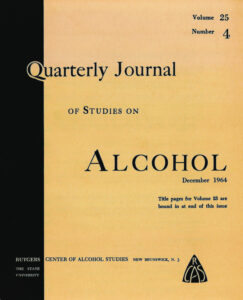The move from Yale to Rutgers in 1962 didn’t happen without controversies and disappointment for the Center and its staff either. The political decision made at Yale to no longer support the Center of Alcohol Studies there significantly influenced the still young field of alcohol studies threatening its advancement (i.e., what if Rutgers hadn’t had the foresight and will?). The move also brought life-changing decisions for each and every individual involved, including prominent figures who made the transition from Yale to Rutgers, such as Selden Bacon, Leon Greenberg, Raymond McCarthy, and Mark Keller.
 In an article published in the Quarterly Journal of Studies on Alcohol in 1962 entitled “Farewell, Yale… And Rutgers, Hail!” A Note on the Transit of the Quarterly Journal of Studies on Alcohol, Keller writes a short note on the transition of QJSA to Rutgers. He talks about the impending separation from the community causing regrets to the staff at the journal, but he has faith in the center, the location, and support of the journal. He points out that the decisive motivators in the final resolution to choose Rutgers was “the warmth, the understanding, the spirit of interest, appreciation and support, exhibited alike by the administration of Rutgers University, by its board of governors, and by leading representatives of the faculty in various departments” (Keller, 1962, p. 3.).
In an article published in the Quarterly Journal of Studies on Alcohol in 1962 entitled “Farewell, Yale… And Rutgers, Hail!” A Note on the Transit of the Quarterly Journal of Studies on Alcohol, Keller writes a short note on the transition of QJSA to Rutgers. He talks about the impending separation from the community causing regrets to the staff at the journal, but he has faith in the center, the location, and support of the journal. He points out that the decisive motivators in the final resolution to choose Rutgers was “the warmth, the understanding, the spirit of interest, appreciation and support, exhibited alike by the administration of Rutgers University, by its board of governors, and by leading representatives of the faculty in various departments” (Keller, 1962, p. 3.).
On the other hand, in a personal letter dated January 19, 1962, Keller shares his private thoughts and discontent with Selden Bacon in response to the news that the Rutgers Board of Governors approved his appointment only with a condition—namely, it would be contingent on the alcohol studies program continuing at Rutgers. If the project were to be terminated, he wouldn’t have any claim on Rutgers for employment. To the academic employee of our times, this sounds like a grant-funded or non-tenure track faculty position.
With his salary at about $12,000 a year, he understands the desire of the boards to protect the university’s budget; however, in his letter he points out his awkward position. Having turned down several other opportunities and solicitations from other institutions, organizations, or publishing houses, he chose the Rutgers appointment and had made arrangements to hire assistants and interviews for the other positions. He also gave up his residence in New Haven and took an apartment in Highland Park, NJ. His wife also resigned her position at the department of chemical engineering.
He decides to take a leave of absence for the next three weeks to work on manuscripts instead of carrying on with the moving program. He feels bad about pretending that he’s going to Rutgers when he can’t tell anyone about this decision of the board of governors. His biggest concern is that people will draw the conclusion that the future of the center is considered doubtful by the board of governors, and it would do great harm. This letter is marked personal and confidential, and was typed by Keller himself, but he allows and encourages Bacon to do whatever he thinks appropriate with it in the interest of the center.
For all his discontent with the initial decision in 1962, Keller’s career was highly successful at Rutgers and beyond, proven by the history of the QJSA and the Center.
References
- K., M. (1962). Farewell, Yale . . . and Rutgers, Hail!; A Note on the Transit of the Quarterly Journal of Studies on Alcohol. Quarterly Journal of Studies on Alcohol, 23(1), 1–3. https://doi.org/10.15288/qjsa.1962.23.001
- Mark Keller’s letter to Selden Bacon (1962). Center of Alcohol Studies Archive. Mark Keller Papers.